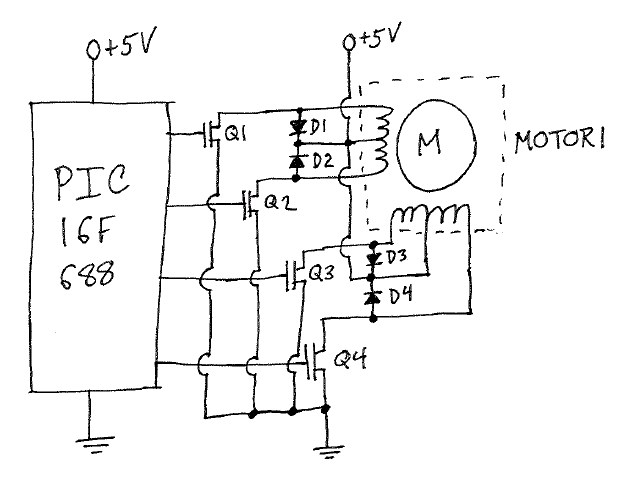Automatic Fish Feeder - Part 2
Schematic

The schematic is extremely simple. I tried to use parts that I already has on hand. I have a few weak stepper motors that I got from an overstock website (MOTOR1). The protection diodes (D1-4) are there to short the surge currents created by the motor coils. This will prevent the MOSFETs (Q1-4) from being destroyed over time. The gates of the MOSFETs are connected to bits <3-0> of Port C on the PICmicro. To minimize the number of parts, I used the built-in oscillator as the PICmicro's system clock. The power supply is a 5V power cable/battery charger for an old cell phone I had.
Source Code
The source code for this project was much more complicated in the beginning. As debugging became more and more frustrating, I rewrote it in the extremely simple version you see below. It is written for the SourceBoost BoostC compiler.
#include <system.h>
#define DEGREES_PER_PULSE 15
/*
* Timer0 prescaler 1:256
* Feed twice a day
* Timer ticks before-prescaler at 1 MHz (4 MHz oscillator)
* Every second is 3906.25 ticks
* Every 12 hours is 168,750,000
*/
#define TICKS_RESET 168750000
#pragma DATA _CONFIG, _INTOSCIO & _WDT_OFF & _PWRTE_ON & _MCLRE_OFF & _CP_OFF & _CPD_OFF & _BOD_OFF & _IESO_OFF & _FCMEN_OFF
void feed (void)
{
portc = 0b00000110; // Turn on stepper motor
unsigned char j;
for (j = 0; j < 2; ++j)
{
unsigned char i;
for (i = 0; i < 12; ++i)
{
portc = 0b00001010;
delay_ms(20);
portc = 0b00000011;
delay_ms(20);
portc = 0b00000101;
delay_ms(20);
portc = 0b00001100;
delay_ms(20);
}
}
portc = 0b00000000; // Turn off stepper motor
}
void main (void)
{
option_reg = 0b01010111;
trisa = 0b11111111;
ansel = 0x00;
wpua = 0xFF;
ioca = 0x00;
trisc = 0xF0;
while (1)
{
feed();
signed short i = 720;
for ( ; i >= 0; --i)
{
delay_s(60);
}
}
}
This code turns the motor one complete revolution every 12 hours. It doesn't minimize power consumption or use interrupts. That would be a lot better, but this started as just a quick project to last for a weekend or two.
